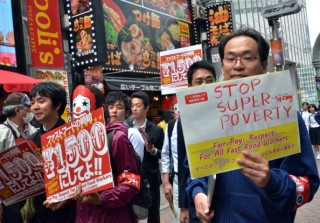Loading
Search
▼ Japan's main labor union decides to seek 2% pay rise in 2015 talks
- Category:Other

MAINICHI
Japan's largest labor union decided Tuesday to seek a 2 percent or greater basic pay raise in annual wage talks starting early next year, a higher goal than set for this year.
The Japanese Trade Union Confederation, known as Rengo, decided at a meeting in Tokyo to press employers to increase the pay scale, in addition to the automatic rise in wages based on seniority.
In this year's wage talks ended last spring, Rengo successfully sought a 1 percent or more pay-scale rise.
Rengo believes employers ought to raise wages again to enable workers to maintain their standard of living following the consumption tax hike in April to 8 percent from 5 percent.
Prime Minister Shinzo Abe has urged business leaders to raise wages to help the government attempt to lift the Japanese economy out of chronic deflation.
The Bank of Japan has continued its aggressive monetary easing, flooding the economy with money while aiming to raise the domestic inflation rate to 2 percent.
But many experts say that with only ultraloose monetary conditions, the economy cannot be revived unless wages rise enough to compensate for the cost-of-living increase fueled by inflation and weak yen.
The Japan Business Federation, which represents the nation's largest companies, has shown some understating of Abe's request. But there are concerns weak consumption following the sales tax hike, as well as the weak yen which has boosted import costs, have weighed on earnings, particularly at small firms, and made raising pay a difficult option.
Campaigning officially began Tuesday for the Dec. 14 general election, with Abe claiming his Abenomics policy has stimulated the Japanese economy.
However, opposition parties criticize gaps between big and smaller businesses' incomes as a result of the policy, which has so far failed to raise inflation-adjusted wages for workers as the economy shrank over the six months through September.
"We increase our focus on improvement (for low-income earners) and reduction in disparities," Rengo President Nobuaki Koga told reporters after deciding on the policy for the annual talks.
For the first time, Rengo also set the minimum achievement member unions should seek in each negotiation.
For example, for a worker who is the head of a two-person household in Saitama Prefecture near Tokyo and works for a small- or medium-sized company, a monthly salary of 209,000 yen (about $1,760) should be sought, and 153,000 yen for a non-regular worker living alone. Both cases are under a premise that they do not own a car.
A 2 percent pay-scale hike means an increase of 6,000 yen or more in monthly salary for workers covered by the Japan Council of Metalworkers' Unions, which groups the labor unions of automotive, electronic and other manufacturers. That core member of Rengo will soon decide its own negotiation policy based on Rengo's.
- December 3, 2014
- Comment (0)
- Trackback(0)

